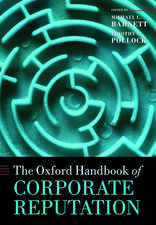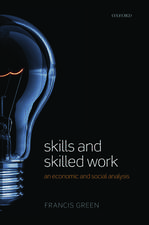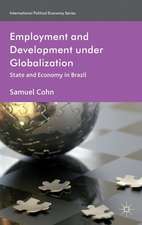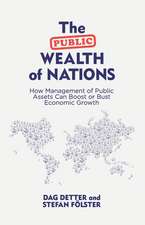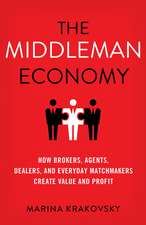Nice Work If You Can Get It – Life and Labor in Precarious Times: NYU Series in Social and Cultural Analysis
Autor Andrew Rossen Limba Engleză Paperback – 2 oct 2010
| Toate formatele și edițiile | Preț | Express |
|---|---|---|
| Paperback (1) | 225.71 lei 6-8 săpt. | |
| MI – New York University – 2 oct 2010 | 225.71 lei 6-8 săpt. | |
| Hardback (1) | 525.85 lei 6-8 săpt. | |
| MI – New York University – 31 mar 2009 | 525.85 lei 6-8 săpt. |
Preț: 225.71 lei
Nou
Puncte Express: 339
Preț estimativ în valută:
43.20€ • 44.93$ • 36.20£
43.20€ • 44.93$ • 36.20£
Carte tipărită la comandă
Livrare economică 13-27 martie
Preluare comenzi: 021 569.72.76
Specificații
ISBN-13: 9780814776919
ISBN-10: 0814776914
Pagini: 272
Ilustrații: black & white illustrations
Dimensiuni: 152 x 227 x 16 mm
Greutate: 0.36 kg
Editura: MI – New York University
Seria NYU Series in Social and Cultural Analysis
ISBN-10: 0814776914
Pagini: 272
Ilustrații: black & white illustrations
Dimensiuni: 152 x 227 x 16 mm
Greutate: 0.36 kg
Editura: MI – New York University
Seria NYU Series in Social and Cultural Analysis
Cuprins
Contents; Acknowledgements vii; Introduction 1; I Creative Workers and Rent-Seeking; 1 The Mercurial Career of Creative Industries 15; Policymaking in the United Kingdom, the European Union and the United States; 2 Chinas Next Cultural Revolution? 53; 3 The Olympic Goose That Lays the Golden Egg 77; II Sustainability and the Ground Staff; 4 Teamsters, Turtles, and Tainted Toys 105; 5 Learning from San Ysidro 131; III Instruments of Knowledge Capitalism; 6 The Copyfight over Intellectual Property 161; 7 The Rise of the Global University 189; Conclusion: Maps and Charters 207; Notes 215; References 219; Index 245; About the Author 264
Recenzii
"Economic liberalization, [Ross] demonstrates, has opened up a frenetic global traffic in jobs and migrants, uprooting people in a manner both useful and troubling to the managers of capital. In short, more people are available to exploit, but they are also harder to control. . . . A thorough and thoughtful study of global professional insecurity. The Times Literary Supplement"With admirable timing, [Ross] examines a global workplace infrastructure that's as shaky as the economy would indicate. . . . Though far from uplifting, this is a bold, pointed look at reality as it is, a far more valuable commodity. Publishers Weekly, Starred Review"According to Ross, job insecurity became commonplace long before the current financial debacle. As economies shifted from industry to information, the benefits and securities of the Keynesian era quietly gave way to a workforce of temps, freelancers, adjuncts, and migrants. Ross finds that city fathers are more interested in Olympic bids and stadium projects than in sustainable employment, while corporations spend more on social responsibility public-relations campaigns than on addressing worker complaints, and activists are too focussed on narrow concerns to find common cause with natural allies. The New Yorker"Illuminating. . . . Who knows what will be on the table when the damage of the global crisis is told? At the very least, one may hope for a return to security, sensible financial regulation, and a renewed interest in economic equity. Other worlds are possible, and with luck thinkers like Ross can point the way to imagining them more fully. BookForum
"...whereas for Euro-Americans the path is from Keynesian consensus to its unravelling by the savagery of neoliberal capitalism. Ross is one of those keen to point out that now, with historical hindsight, the Keynesian moment where state security (in the form of public pensions, education and so on) offsets the wilder excesses of capital increasingly looks like a historical blip. But he points out that not only did the temporary Fordist truce rely on imperialism, rigid social hierarchies and a reservoir of unpaid domestic labour, but that today is no simple neo-Victorian age: pre- and post-Fordist moments are qualitatively different. For whereas the Great Depression was the result of a collapse of capitalist control, contemporary precarity is the result of capitalist control, as organizations have eagerly embraced the flexploitation of short-term contracts and outsourcing as the new template for work . . . As we are encouraged to be entrepreneurial subjects scrabbling over each other for success in a so-called meritocracy. Radical Philosophy, November 2010"This excellent and, in places, brilliant book should be read by anyone interested in a timely and astute analysis of the malaise of life and work in neoliberal postmodern society. . . . Highly recommended. Choice
"...whereas for Euro-Americans the path is from Keynesian consensus to its unravelling by the savagery of neoliberal capitalism. Ross is one of those keen to point out that now, with historical hindsight, the Keynesian moment where state security (in the form of public pensions, education and so on) offsets the wilder excesses of capital increasingly looks like a historical blip. But he points out that not only did the temporary Fordist truce rely on imperialism, rigid social hierarchies and a reservoir of unpaid domestic labour, but that today is no simple neo-Victorian age: pre- and post-Fordist moments are qualitatively different. For whereas the Great Depression was the result of a collapse of capitalist control, contemporary precarity is the result of capitalist control, as organizations have eagerly embraced the flexploitation of short-term contracts and outsourcing as the new template for work . . . As we are encouraged to be entrepreneurial subjects scrabbling over each other for success in a so-called meritocracy. Radical Philosophy, November 2010"This excellent and, in places, brilliant book should be read by anyone interested in a timely and astute analysis of the malaise of life and work in neoliberal postmodern society. . . . Highly recommended. Choice
Notă biografică
Descriere
Are we all temps now? A penetrating exploration of how making a living has become such a precarious task










